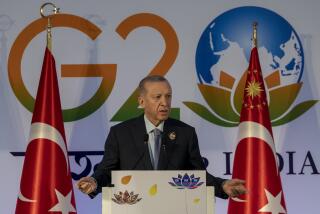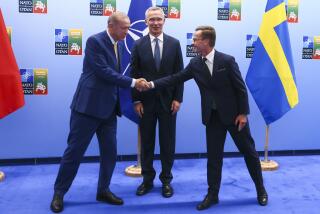Erdogan Win in Turkey May Boost U.S. Bid
- Share via
ANKARA, Turkey — He held no public office, but his clout was such that President Bush invited him to the White House to solicit his support. And when Recep Tayyip Erdogan told American officials “not to worry” about legislative approval for 62,000 U.S. troops to cross Turkey for an assault on Iraq, they had every reason to believe him.
So it was not only Turkey’s long alliance with Washington but also Erdogan’s authority that suffered when parliament rejected the deployment. Reacting to the surprise decision, Erdogan seemed resigned. “It was a completely democratic result,” he said, throwing up his hands. “May it be for the best.”
But Erdogan, a lifeguard’s son who rose from poverty to become the leader of Turkey’s ruling party, is a man who makes good on second chances.
According to aides, he swallowed his anger over the March 1 revolt by his party’s lawmakers and began searching quietly for a way to reverse the close vote. A second chance -- for Erdogan and for Pentagon planners of a Turkey-based northern front against Iraq -- could come soon. On Sunday, he won his own seat in parliament, clearing the way for him to become prime minister as early as this week.
Although the office would strengthen his hand to nudge lawmakers behind the war effort, Erdogan refuses to say whether he will even try. He is hearing out party dissidents, urging last-minute concessions from Washington and taking care this time not to promise too much.
“I honestly believe he has not decided,” Rep. Ed Whitfield, a Kentucky Republican who is part of a three-person delegation in the region, said after a 2 1/2-hour meeting with the Turkish leader late Friday. “He values the U.S.-Turkish relationship. But it is also clear that his overriding interest is going to be the impact of the war on the Turkish people. It is their neighborhood.”
Emin Sirin, a member of the ruling Justice and Development Party who sits on parliament’s foreign affairs committee, said Erdogan would need firmer economic and security guarantees from the United States, which has already offered $15 billion in aid, to turn the vote around. “To ask for a second vote on the same conditions would be political suicide for him,” Sirin said.
Whatever path he chooses, the 49-year-old prime minister-in-waiting is determined not to fail again, those who know him say. He has keen survival instincts and a record of thriving on adversity, learning from mistakes, turning defeat into victory.
As a boy, he sold lemonade and sesame buns on the streets of Istanbul, where his parents had migrated from the Black Sea coast. Later, he attended a religious school and studied management at Marmara University. Tall and muscular, he played professional soccer before gravitating to politics under the spell of Necmettin Erbakan, who became prime minister in 1996 and was forced by the army to resign a year later for pursuing an Islamist agenda.
Unlike his mentor, Erdogan proved an effective manager. As mayor of Istanbul, he improved garbage collection and crime prevention. Like Erbakan, he was given to rhetorical excess. In 1998, he went to jail for four months and was barred from public office for inciting religious hatred after reciting a poem with Islamist overtones at a rally.
Erdogan’s election to parliament Sunday capped a five-year struggle since his conviction for a second chance against Turkey’s army-led secular establishment. A turning point came 18 months ago when he broke from his mentor’s religious-based movement, which had been outlawed, to found Justice and Development as a conservative secular party.
“He evolved as a political animal,” said Fehmi Koru, an influential columnist and Muslim intellectual. “As his ambitions widened, he realized that radicalism does not solve problems.”
The new party swept 363 of parliament’s 550 seats in elections last November, riding voter anger over the cronyism and corruption that have hobbled Turkey’s political system for decades. The new parliament reversed the ban against him, enabling his candidacy Sunday for a vacant seat from Siirt, his wife’s birthplace in southeastern Turkey and the scene of his infamous poetry recital.
Erdogan’s successful self-portrayal as a convert to pro-Western values, coupled with the biggest parliamentary majority here in a decade, appeared to offer Turkey’s 67 million people one of their best shots at becoming a modern, democratic, stable and prosperous Islamic nation.
Having once dismissed the European Union as a “Christian club,” Erdogan now wants Turkey in. Meeting the EU’s entry standards will oblige him to end the police practice of torturing prisoners, give Turkey’s 12 million ethnic Kurds the right to broadcast and teach in their native language, and withdraw troops from northern Cyprus, facilitating a unification accord between ethnic Greek and Turkish enclaves on the war-divided island. Erdogan was quick to condemn the Sept. 11 terrorist attacks and favors Turkey’s continued military cooperation with Israel.
He has also pledged to stick to the International Monetary Fund’s market liberalization plan for Turkey, while trying to renegotiate spending curbs that have deepened Turkey’s worst recession in half a century.
But before he can even begin to tackle the country’s deep-seated problems, Erdogan must reassert control over his suddenly unruly party and, under the pressure of seemingly imminent war, mend fences with Washington.
Despite its setback here, the Bush administration still has a “generally positive and benign view” of Erdogan and considers him “moderate, thoughtful, serious,” said one U.S. official.
Ibrahim Gungen, an Istanbul shipowner who met Erdogan when he was mayor in the mid-1990s, offers a similar assessment. “He has an average education, but his big plus is his emotional quotient,” Gungen said. “He looks you right in the eye. He knows how to listen and judge people and ideas. This gives him the capacity to come up with the best advice.”
The stakes are huge and conflicting. Turkey could stand to forfeit influence in postwar Iraq and compensatory U.S. aid if it were to sit out a conflict with Saddam Hussein. That would infuriate some army leaders, who still doubt Erdogan’s secular credentials and would like to see him fail.
Yet a vast majority of Turks still oppose abetting an attack on a Muslim neighbor, and a new vote in parliament could fragment his party, making it harder to govern and hurting investor confidence in Turkey’s recovery.
“Erdogan has been in dress rehearsal for the prime minister’s job since the November election,” said Fehmi Calmuk, author of a biography of the leader. “But as soon as he takes office, his legend will suffer. He is coming to power at a most difficult time.”
The crisis he inherits is partly of his own making. While arguing that Turkey could not afford to spurn its powerful ally, Erdogan stopped short of obliging his party’s lawmakers to fall into line, saying democracy within the party was more important. Having never served in parliament, he miscalculated the power of public opinion to spur the legislators’ defiance.
But his move to the top government post will end four awkward months in which Erdogan tried to wield power behind Prime Minister Abdullah Gul, a protege who supported the U.S. deployment but was even less effective at selling it.
Gul is expected to resign Wednesday, when Erdogan’s election to parliament becomes official. Pressure is building on the party leader to secure some form of cooperation on Iraq -- from the armed forces and from ordinary Turks angered by the higher taxes and spending cuts imposed last week to offset the possible loss of U.S. aid.
*
Times staff writers Paul Richter and Robin Wright in Washington contributed to this report.
More to Read
Sign up for Essential California
The most important California stories and recommendations in your inbox every morning.
You may occasionally receive promotional content from the Los Angeles Times.













